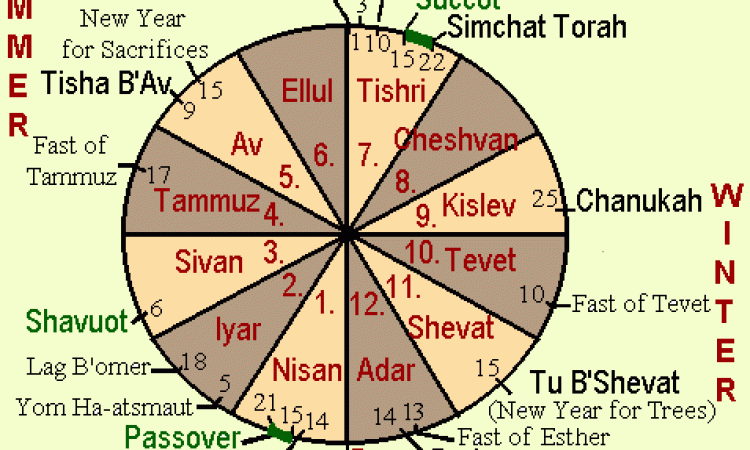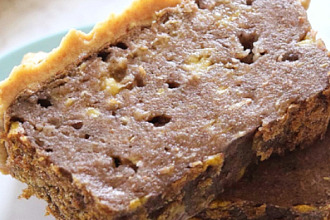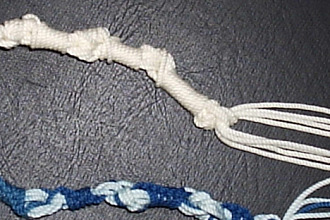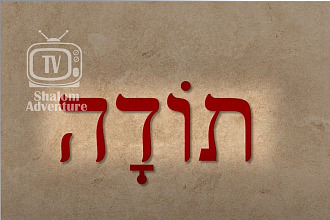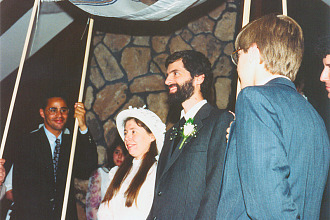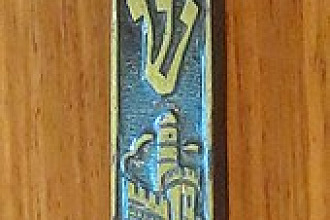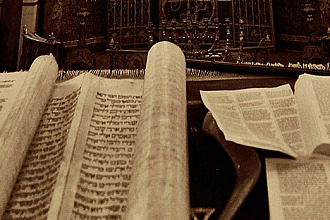LUNAR-SOLAR CALENDAR.
The Jewish calendar is based mainly on the phases of the moon; but it also regulates itself to a lesser degree by the sun.
God said let there be lights in the firmament of the heaven to divide the day from the night; and let them be for signs and for festivals, for days and for years.1. There are twelve lunar months which begin at a new moon. Their names are Nisan, Iyar, Sivan, Tammuz, Av, Ellul, Tishri, Cheshvan, Kislev, Tevet, Shevat and Adar. Just as the Gregorian calendar has to add an extra day once in four years because the solar year is not an exact number of days, so the Jewish calendar adds an extra month, called Second Adar, seven time in nineteen years because it is not an exact number of months. This prevents the festivals moving round the year, as happens in some lunar calendars. This also enables harvest festivals to fall at set dates in the year.
(1.) Genesis 1, 14
HISTORY OF THE CALENDAR.
Although the early history of the calendar is not clear, most scholars believe that the present calendar is a combination of two systems. One system began the year in spring and the other in autumn. In several places the Bible lists the festivals starting from the spring time.2. However, the autumn harvest festival is referred to as either at the end or the turn of the year.3. Another indication of the second calendar is found in the old names of months that are found there.4. At this period the years were reckoned according to year of the reign of the current Jewish king. One of the earliest Hebrew inscriptions which have been found is the c.10th century BCE Gezer Calendar, which lists an agricultural year beginning with the autumn harvest, written in ancient Hebrew script.
By the time of the Roman period Josephus was speaking of two new years one in spring and one in autumn.5. At the end of the 1st century CE the Jewish calendar had still not been fully accepted by all Jews. There was a famous dispute between Rabban Gamaliel II and Joshua ben Hananiah over the dates of festivals.6. While the Book of Jubilees and the sect of the Dead Sea Scroll community both observed a different calendar to other Jews.
(2.) Exodus 23, 14 - 19, Leviticus 23 and Deuteronomy 16. (3.) Exodus 23, 16 and Exodus 34, 22. (4.) Aviv in Exodus 23, 15, etc. Bul in 1 Kings 6 38, etc. Ziv in 1 Kings 6, 1 and Etanim in 1 Kings 8, 2. (5.) Antiquities 1, 3, #3. (6.) Rosh Hashanah 2, 8-9.
FIXING THE CALENDAR.
For many years the beginning of the months was fixed by observation of the new moon attested by witnesses coming before a Beth Din (Rabbinic Court).7. Leap year months were inserted when they went into the fields and found that the crops would not be ready for harvesting at Passover. However, in the 4th cent. CE, in the time of Hillel II astronomical knowledge was sufficiently advanced to enable dates to be fixed in advance by calculation and so the present calendar was fixed.
Originally found here

